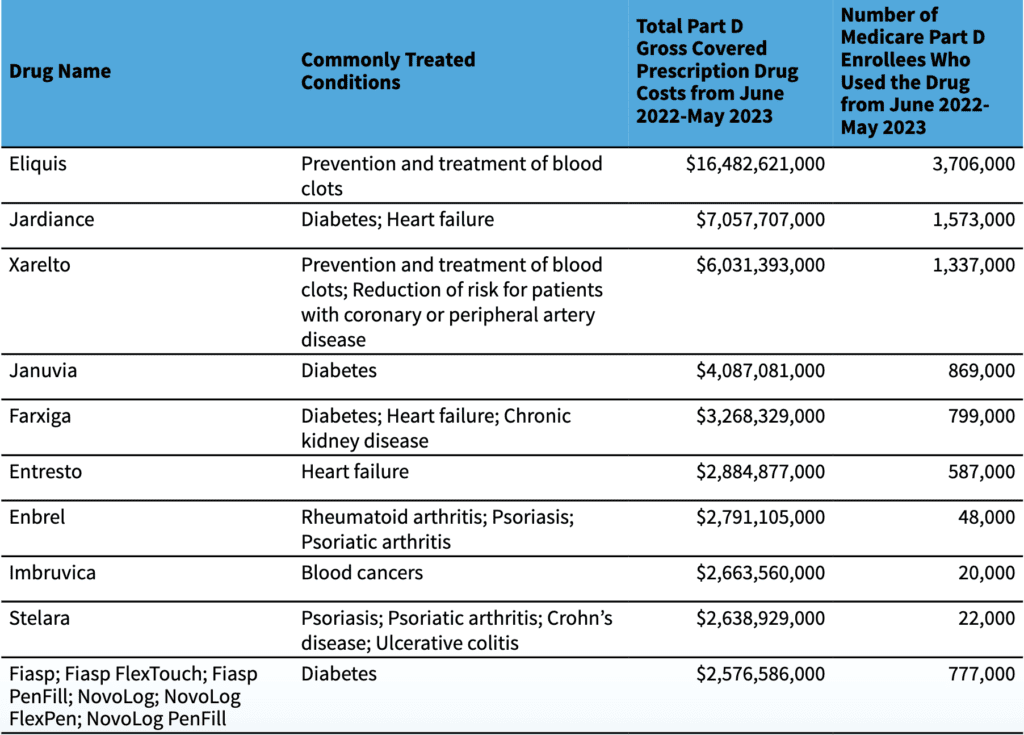Search Posts
Recent Posts
- Outdoors in RI: Help keep recreation areas clean. Invasive Milfoil, trash. 2A update – Jeff Gross July 26, 2024
- Real Estate in RI: Highest-ever sale in Queen’s Grant, EG $1.25M, by Residential Properties July 26, 2024
- Homeless in RI: Gov. Newsom issues Executive Order. Remove California’s encampments. July 26, 2024
- Let the games begin. XXXIII Summer Olympics – John Cardullo July 26, 2024
- GriefSPEAK: What would you do? – Mari Dias Nardolillo July 26, 2024
Categories
Subscribe!
Thanks for subscribing! Please check your email for further instructions.

Medicare to negotiate select drug prices with Big Pharma, lists first 10 drugs. – Herb Weiss
By Herb Weiss, contributing writer on aging issues
While critics are attempting to go through the courts to put the brakes on allowing Medicare to negotiate and set drug prices, last week, the Biden administration announced its list of 10 drugs that will be subject to price negotiations mandated by the Inflation Reduction Act (IRA).
Earlier this month, more than 70 groups and a petition signed by 150,000 individuals called on Merck & Co., Bristol Myers Squibb Company, Janssen Pharmaceuticals, Astellas Pharma US, Pharmaceutical Research and Manufacturers of America (PhRMA) and the U.S. Chamber of Commerce, to drop their lawsuits to block the drug price negotiation provisions from taking place, and several organizations filed an amicus brief in support of the Biden administration’s historic law.
With President Biden signing the IRA into law in Aug. 2022, the Centers for Medicare and Medicaid Services (CMS) began hammering out the regulations by issuing on March 15, 2023 its initial guidance for its Medicare Drug Price Negotiation Program. At that time, CMS had received over 7,500 comments on its initial guidance from consumer and patient groups, drug companies and pharmacies. On June 30, 2023, the federal agency released its revised guidance detailing the requirements and parameters for the program. With the publishing of the listing of 10 drugs on August 29, 2023, for the first time, Medicare is now able to move forward in negotiating prices directly with drug companies, with the goal of lowering prices on some of the costliest prescription drugs.
According to CMS, the selected 10 drugs accounted for $50.5 billion in total Part D gross covered prescription drug costs, or about 20%, of total Part D gross covered prescription drug costs between June 1, 2022, and May 31, 2023, which is the time period used to determine which drugs were eligible for negotiation. The negotiations with participating drug companies begin now until 2024, and any negotiated prices will become effective beginning in 2026. Medicare beneficiaries taking the 10 drugs covered under Part D selected for negotiation paid a total of $3.4 billion in out-of-pocket costs in 2022 for these drugs.
It’s a Long Wait…Lower Prices to Take Effect Jan. 2026
CMS will publish any agreed-upon negotiated prices for the selected drugs by September 1, 2024; those prices will come into effect starting January 1, 2026. In future years, CMS will select for negotiation up to 15 more drugs covered under Part D for 2027, up to 15 more drugs for 2028 (including drugs covered under Part B and Part D), and up to 20 more drugs for each year after that, as outlined in the IRA. CMS will provide opportunities for public comment at patient-focused listening sessions in Fall 2023.
“For far too long, pharmaceutical companies have made record profits while American families were saddled with record prices and unable to afford life-saving prescription drugs,” says Secretary Xavier Becerra, of the U.S. Department of Health and Human Services (HHS). “Although drug companies are attempting to block Medicare from being able to negotiate for better drug prices, we will not be deterred,” she pledges.
With the announcement of the first drugs selected for Medicare drug price negotiation, CMS Administrator Chiquita Brooks-LaSure noted it marked a significant and historic moment for the Medicare program. ”Our goal with these negotiations is to improve access to some of the costliest drugs for millions of people with Medicare while driving competition and innovation,” she said.
Adds Meena Seshamani, MD, PhD, CMS’s Deputy Administrator and Director of the Center for Medicare, “Promoting transparency and engagement continue to be at the core of how we are implementing the new drug law and the Medicare Drug Price Negotiation Program, and that is why we set out a process for the first round of negotiation that engages the public throughout.”
“No one should have to choose between paying for lifesaving medication and other basic necessities, like food and housing,” says Rep. Seth Magaziner, representing Rhode Island’s Congressional District 2. Nearly 191,000 Rhode Islanders are enrolled in Medicare Part D and could be eligible for cost savings that results from CMS’s negotiating with drug makers, he says, noting that. Rhode Island seniors paid an average of $6,022 in out-of-pocket costs per year for one of the drugs selected for Medicare Price Negotiations. These drugs are used to treat some of the most common diseases like diabetes, heart disease, arthritis, blood clots, and cancers.
But PhRMA and U.S. Chamber of Commerce express strong concerns over imposing government price controls on the price of medications.
CMS’s release of 10 drugs selected for negotiation “is the result of a rushed process focused on short-term political gain rather than what is best for patients,” says PhRMA) President and CEO Stephen J. Ubl. “Many of the medicines selected for price setting already have significant rebates and discounts due to the robust private market negotiation that occurs in the Part D program today,” he claims.
“Giving a single government agency the power to arbitrarily set the price of medicines with little accountability, oversight or input from patients and their doctors will have significant negative consequences long after this administration is gone,” warns Ubl.
Furthermore, “insurance companies and their Pharmacy Benefit Managers may further restrict access to medicines through increased utilization management, higher copays and more restrictive formularies, notes Ubl.
USCoC also expresses strong concerns over HHS’s move to impose government price controls on medications. While USCoC is supportive of affordable medications, it warns that an implementing government price controls scheme is both “counterproductive and will restrict access to critical medicines, delay treatment for patients, and jeopardize the search for new lifesaving cures,” says Executive Vice President and Chief Policy Officer Neil Bradley.
“In its rush to implement the IRA’s price control scheme, the Biden administration failed to examine the likely negative side effects of the policy, charges Bradley.
Celebrating a Sweet Victory
“The negotiated drugs list is a watershed moment for medicine affordability. Drug corporations pretend this is a catastrophe, but I would rather see that money in seniors’ pockets than Big Pharma’s,” says Peter Maybarduk, director of the Access to Medicines program at Public Citizen
“Drug corporations, in crude arrogance, are suing to limit price negotiations under the IRA. But the list shows instead how important it is to expand those negotiation powers. Several monopolized drugs that are expensive for Medicare today are exempted from price negotiation, and will remain expensive,” predicts Maybarduk, explaining that for a many-years long grace period after a drug first comes to market. “During those years, drug makers will exploit patent monopolies with minimal checks on profiteering. That profiteering period is even longer for biologics, which comprise some of the most exorbitantly priced drugs,” he says.
“This is an historic day in the effort to lower prescription drug prices for seniors. The Biden administration has released the names of the 10 life-saving drugs that will be subject — for the first time ever — to price negotiation between Medicare and Big Pharma,” stated Max Richtman, President and CEO, National Committee to Preserve Social Security and Medicare.
According to Richtman, the Inflation Reduction Act provides for this reform, in addition to a $2,000 out-of-pocket cap for patients’ Medicare Part D drug costs and penalties for drug-makers who hike prices above the rate of inflation. Medicare price negotiation alone is expected to save seniors and taxpayers billions of dollars in drug costs over next the decade.
“This is a sea change in the government’s ability to lower prescription drug prices for older Americans, who all too often are compelled to ration medications or forgo filling prescriptions because of soaring costs. NCPSSM has fought for Medicare to be empowered to negotiate prices for some twenty years now,” adds Richtman., noting that the next step is to enlarge the number and type of medications subject to negotiation, to deliver maximum relief to seniors on fixed incomes.
“Allowing Medicare to negotiate prices for these first 10 drugs will finally bring much needed access and relief to American families, particularly older adults. We cannot overstate how monumental this law is for older Americans’ financial stability and overall health, said AARP Executive Vice President and Chief Advocacy and Engagement Officer Nancy LeaMond.
“The big drug companies and their allies continue suing to overturn the Medicare drug price negotiation program to keep up their price gouging. We can’t allow seniors to be Big Pharma’s cash machine anymore. AARP will keep fighting to protect Medicare negotiation from any efforts to undo or weaken it, so all older Americans can afford their lifesaving medicines,” Says LeaMond.
And Alex Lawson, Executive Director of Social Security Works, says CMS’s listing of 10 drugs are among the most outrageously priced drugs on the market, calling these drugs, “Pharma’s prized cash cows.”
“This is just the beginning,” says Lawson, predicting that within a decade, Medicare will have the power to negotiate lower prices on well over 100 drugs. “That’s a huge win for seniors and people with disabilities,” she adds, noting that it is the biggest legislative defeat Big Pharma has ever suffered – and it won’t be the last.
The 10 drugs list:

Final Note…
Vincent Marzullo, who serves on the Board of the Senior Agenda Coalition of RI as well as a member of Congressman Magaziner’s Senior Advisory Committee, says that despite CMS’s announcement of the 10 drugs to be negotiated, consumers won’t realize a penny in savings until January 2026, 28 months from now. “Unfortunately, urgency seems not to be a feature of the Inflation Reduction Act at least when we will get lower priced prescriptions,” he says.
View a fact sheet from the Office of the Assistant Secretary for Planning and Evaluation (ASPE) at: https://aspe.hhs.gov/sites/default/files/documents/705b9c384d493e442a1d4004905cf8ae/ASPE-IRA-Drug-Negotiation-Fact-Sheet.pdf.
More information on the Medicare Drug Price Negotiation Program is available at https://www.cms.gov/inflation-reduction-act-and-medicare/medicare-drug-price-negotiation.
___

Herb Weiss, LRI -12, is a Pawtucket-based writer who has covered aging, health care and medical issues for over 43 years. To purchase his books, Taking Charge: Collected Stories on Aging Boldly and a sequel, compiling weekly published articles, go to herbweiss.com.

